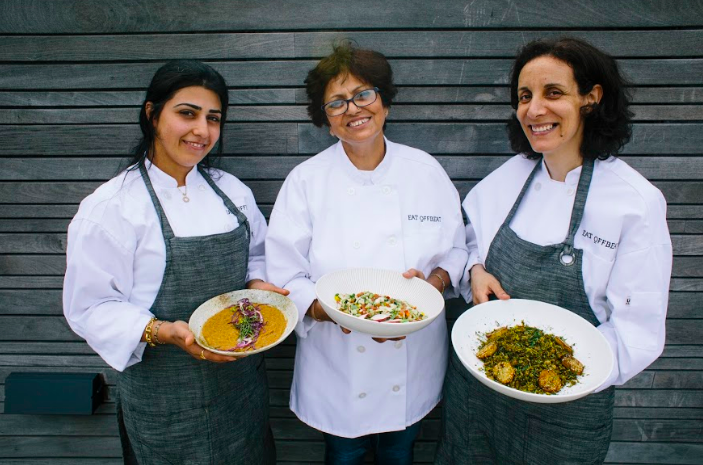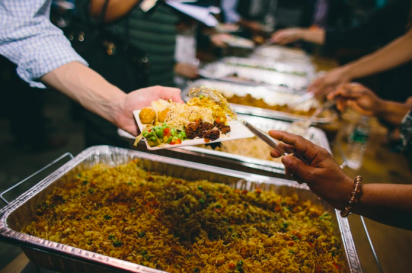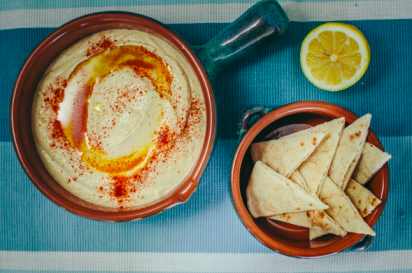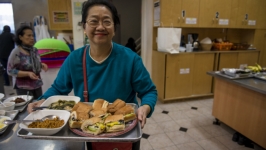Refugee-Run Eat Offbeat Is Blazing Its Own Food Delivery Trail
Having moved to New York City from Lebanon in 2013 to pursue a master’s degree in international affairs at Columbia University, Manal Kahi never expected to forge a culinary career. Yet after a failure to find decent hummus prompted her to make her own, the seed was improbably planted for a globally inspired catering company, called Eat Offbeat.
Instead of simply selling authentic chickpea dip, however, the Queens-based delivery service offers a wealth of dishes from skilled, self-trained cooks, each focused on making traditional, homestyle fare from their native countries. And not only does it feature cuisine from underrepresented—even in New York City—nations, such as Eritrea and Iran, Eat Offbeat has an especially socially conscious through line: Its chefs are all resettled refugees.
“We were right in the midst of the refugee crisis back in Lebanon, and I was feeling guilty about not being able to do anything about what was unfolding. So it kind of just made sense,” Kahi said. “We were sure refugees being sent here had amazing recipes that they were making for their families, and that they’d be more than eager to share them with other New Yorkers.”
Working with the International Rescue Committee to identify promising, passionate workers, Eat Offbeat currently employs 13 chefs and sous chefs, including Dhuha from Iraq, Benicyha from Central African Republic and Rachana from Nepal. And while Kahi insists that the program is open to anyone, at present 100% of their cooks are female, as is 97% of their overall staff.
“The fact is, of the cultures currently represented in our kitchen, women traditionally hold the role of home cooks. And statistically, there are more women refugees than men,” Kahi explained. So while Eat Offbeat’s primary focus remains on immigration issues, it’s addressing gender disparities in the food industry as well—providing not only entry into a predominately male business, but shining a much-needed spotlight on the worthy women within it.
“Back in our early days, we were working in a shared space, alongside a number of other companies primarily run by men,” remembered Kahi. “One of our cooks said that was because men were better chefs than women, and that statement really surprised me. Especially since she herself was so talented!”
“Part of the problem is they don’t see female chefs around them and on TV. There aren’t a lot of examples that they can look up to,” she continued. “So we’re also on a mission to prove that women are equally talented and accomplished … so we can hopefully change their mindset over time.”
And that’s not the only positive—if unintended—outgrowth of Eat Offbeat. While Kahi stressed they’re neither a placement service nor training ground (save for imparting skills required to flourish within the company), the very nature of the business has inspired a symbiotic community. So not only have the women learned to operate in a commercial kitchen (and feed up to 500 customers a day, as opposed to a family of five), they’ve been able to acclimate each other to day-to-day life in New York City, whether that means sharing tips on child care or offering guidance on using Google Maps.
It’s proved a valuable addition to New York City’s food delivery scene as well, allowing diners to take a gastronomic journey across multiple continents without even leaving their office. (The service is currently only available to order for groups of 10 people or more, although Kahi hopes eventual expansion plans will allow for individual orders.) Eat Offbeat menus range from $15 to $30 per person, with the potential for a single meal to kick off in Nepal, with fried green jackfruit and soya salad; wind its way to Iraq, for savory pie stuffed with chicken, mushrooms and pomegranate molasses; travel to Eritrea for berbere-spiced lentil purée, circle back to Nepal for chicken meatballs doused in cashew sauce; and touch down in Iran, for sour cherry and pistachio rice served with pita.
So, while a desire to support its principled mission might initially draw patrons to Eat Offbeat, it’s the incredible food—and compelling stories—that have kept the concept solvent. Return customers know to keep an eye out for Dhuha’s potato kibbeh (which not even Chief Culinary Officer Juan Suarez de Lezo, who has experience in Michelin-starred kitchens, has been effectively able to replicate) and Nasrin’s rooz, a rice dish she basically reinvented to sidestep the Iranian ingredients she was unable to procure in the States.
“We’re really trying to establish the connection between the people who are eating, and the people who prepare the food,” Kahi said. Each dish comes with a card with the cook’s photo on it, and the same women who make the meal are the ones who bring it over, so they can actually engage in conversation about what they’re serving, and answer questions. This is rarely the case in restaurants, where guests never see the cooks and never know their names.
“Home-style chefs bring a home-style feel to the food. So even when it’s made in quantities for hundreds, you still feel like you’re eating at home,” Kahi emphasized. “Our meals are not only unique but they’re comforting, because when our chefs cook for you, it’s like they’re cooking for their family.”
Eat Offbeat | @eatoffbeat
International Rescue Committee | @theirc








